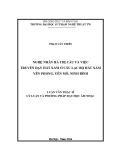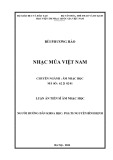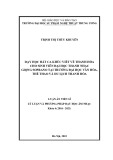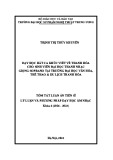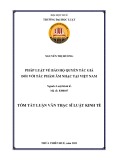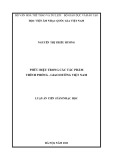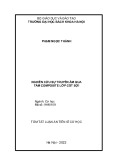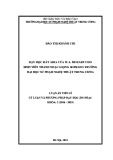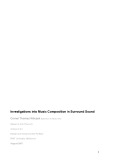
Passion, Identity, and the Model of Goal-Directed Behaviour in a Classical Music Context
A thesis submitted in fulfilment of the requirements for the degree of Doctor of
Philosophy
Eudora Tong
BA. BMus(Hons), MMus Melb
School of Economics Finance and Marketing
College of Business
RMIT University
March 2016

Declaration
I certify that except where due acknowledgement has been made, the work is that of the
author alone; the work has not been submitted previously, in whole or in part, to qualify for
any other academic award; the content of the thesis is the result of work which has been
carried out since the official commencement date of the approved research program; any
editorial work, paid or unpaid, carried out by a third party is acknowledged; and, ethics
procedures and guidelines have been followed.
Eudora Tong
13.5.16

“And this is not your own doing; it is the gift of God, not a result of works, so that no
one may boast.”
With boundless love and appreciation, the researcher would like to extend her
heartfelt gratitude to these people who helped her bring a doctorate into reality:
Her primary supervisor, Dr. Christopher White, whose amazing confidence, care and
wisdom took her along to unimaginable opportunities;
Supervisors Professor Tim Fry and Assoc. Professor Michael Schwartz who gave their
time to meet and review her writings;
God-chosen parents of 29 years, whose sacrifices nourished her;
The Panel of Examiners for their constructive comments and critiquing;
And finally Keith, the most patient and understanding man who sat by her while she
worked, chauffeured her from desk to home every day and in every season, attended
all of her milestones, and whose unending love as a husband travelled her from start
to end.

Abstract
Studying the motivational behaviour of classical music concert audiences is timely given that
attendance at live classical music concerts in Australia and internationally is not currently a popular
entertainment option, with a global trend of aging audiences and declining attendance (Allday,
2012). The aim of this research is to deepen insight into the social-psychological factors that
influence the formation of a desire to attend classical music concerts and to better predict people’s
positive behavioural responses towards live classical music performances. In so doing, the following
three research objectives will be addressed: i) determine whether the inclusion of passion and
identity will provide a more robust alternative to the MGB in a classical music context, ii) identify
moderators that deepen theoretical underpinnings of the development of goal-directed marketing
behaviours, and iii) enhance opportunities for marketing practitioners to foster positive behavioural
responses by considering the factors that influence current classical music concert attendance.
Defining ‘motivation’ as a combination of forces that initiate, direct and sustain goal-directed
behaviour, the Model of Goal-directed Behaviour (MGB), which incorporates social, physiological,
cognitive, philosophical and psychological dimensions, stands as the most current and appropriate
model to account for human motivational behaviour.
While the MGB is frequently applied, it has not been applied in a context that evaluates hedonistic
activities like attending classical music concerts. Further, it appears that the MGB’s account of desire
towards goal achievement is extrinsic in nature. For example, the desire towards dieting behaviour is
seen to stem from the external goal of losing weight. This contrasts with the desire to attend
classical music concerts, whereby the behaviour of concert attendance is desired as an end in itself
without an external goal. Hence, in performing a behaviour for its own sake, one’s desire can be
considered to be intrinsic. Therefore, in light of the research gap in applying the MGB to a context
that assesses hedonistic value and accounts for intrinsic desire, this study applies an improved
version of the MGB – the Model of Passion and Goal-Directed Behaviour (MPGB) – to the context of
live classical music concerts to explain attendees’ motivations.
Given the parallels between desire and passion (Linstead & Brewis, 2007) and the unexamined
influence of intrinsic desire within the MGB, a more intricate link between desire and passion is thus
proposed. That is, as conceptualisations of desire and identity have surfaced in countless definitions
of passion, with the construct of passion closely associated with self-defining activities that reflect a
person’s identity (Vallerand, 2012), and the MGB’s inability to explain why a particular goal is chosen
over others, this study posits an intrinsic, sustaining form of desire expressed in passion.
Therefore, by broadening the MGB to incorporate the constructs of passion and identity and
measures of consumer word-of-mouth behaviour (WOM), repurchase behaviour and customer
voluntary participation (CVP), the present research developed the MPGB which takes into account
intrinsic desires and the significance of goal relevance in influencing intention and behavioural
responses, and considers the impact of attitude, subjective norms, anticipated emotions and
perceived behavioural control on behavioural loyalty.
As similar research on the MGB has previously been successfully carried out by Perugini and Bagozzi
(2001) and Perugini and Conner (2000) using quantitative methods, and as the present research is
interested in exploring the contributions of passion and identity within the MGB, a quantitative
approach was chosen. A quantitative approach enables faster data collection and enhances insight
into arts marketing where qualitative research is more commonly employed. Utilising scales with

multiple indicators drawn from high-quality journals of high reliability and construct validity, and
adapting where necessary, the design of the questionnaire was based on key theories and previously
validated measurement scales in psychology, marketing and performing arts studies identified in the
literature review. All constructs were measured using multiple items and seven-point Likert-type
scales. Through web-based surveys, a convenient sampling method was chosen for data analysis.
Thereafter, common factor analysis and structural equation modelling were employed to test the
subsequent hypotheses.
The results revealed that: i) desire is a strong predictor of passion, with attitudes being the strongest
predictor of desire; ii) passion is a significant predictor of behavioural responses, most strongly
predicting WOM, followed by repurchase behaviour and CVP; iii) identity is an important predictor of
both desire and passion (it has a stronger influence on passion) and also has the strongest indirect
influence on all three behavioural responses; and iv) the inclusion of passion and identity
demonstrates a more robust alternative to the MGB in a classical music context. In explaining 25.8%,
23.3% and 5.5% more variance for WOM, repurchase behaviour and CVP, respectively, the MPGB
clearly outperforms the MGB.
More important, however, was this study’s discovery that intention becomes non-significant when
passion is added to the model. This suggests the possibility of bias in the intention–behavioural
outcome relationship in the MGB; validates that intrinsic desire exists apart from extrinsic desire so
that, in the MPGB, desire consists of both intrinsic and extrinsic dimensions leading to two
manifestations of desire – passion from intrinsic desire and extrinsic desire from intention; and
emphasises passion as an indispensable construct. With intention becoming non-significant when
passion is included in the model, passion, not intention, is evidently the critical component
predicting classical music consumers’ behavioural responses.
Basic psychological needs, however, did not moderate classical music concert attendance,
suggesting that needs fulfilment might become an outcome in the context of enjoyable leisure
consumption while it functions as a moderating variable for task-related and negative forms of
behaviour. In this regard, as desire more strongly predicted passion for people with higher levels of
needs fulfilment than those with a lower level of needs fulfilment, attendees’ enjoyment of classical
music and their desire to attend more concerts are perceived to enhance their passion for classical
music, leading to higher levels of needs fulfilment. Age, socioeconomic status and past behaviour
had significant moderating effects, thus leading to key implications for marketing managers of
classical music organisations.
Overall, marketing managers, music event managers and public sector organisations involved in arts
policy-making will benefit by employing the MPGB in their marketing strategies. As the low age and
low SES group’s desire to attend classical music concerts is influenced by attitudes, perceived
behavioural control and sense of identity, while the influence of subjective norms clearly impacted
the high age and high SES groups; and identity and perceived behavioural control were influential
factors for the high past behaviour group, marketing strategies could thus be specifically developed
to incorporate these noteworthy constructs. Our study has shown that, by engendering favourable
attitudes towards classical music among consumers, providing them with a sense of personal control
over their decision to attend concerts, and helping them develop a sense of identity as a classical
music concert attendee, consumers’ positive behavioural responses towards live classical music
performances will be encouraged. In light of the evident impact of passion on positive consumer
responses, our study has paved the way for passion-based marketing, so that future marketing
strategies should generate within consumers an autonomous liking and valuing of classical music,
and a sense of self-importance related to classical music.

